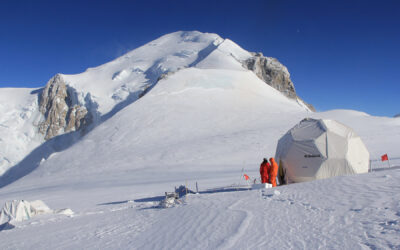LAS VEGAS, Nev. (May 18, 2017): Building on more than 40 years of service to the U.S. Department of Energy, the Desert Research Institute (DRI) announced today it has been awarded a long-term research contract to support the national security mission of the Nevada National Security Site (NNSS).
The new Technical Research, Engineering, and Development Services contract has a value of up to $47.7 million and extends for up to five years. DRI faculty and staff will provide scientific and engineering services to the U.S. Department of Energy (DOE), National Nuclear Security Administration/Nevada Field Office in support of nuclear stockpile stewardship, nonproliferation and counterterrorism, emergency response to radiological and nuclear events, remediation and restoration of legacy environmental issues, cultural resources compliance, and sustainable land stewardship.
“This is the largest multi-disciplinary research program at DRI,” said Dr. Robert Gagosian, DRI Acting President. “We have a superb team of people from across the Institute – on both our Las Vegas and Reno campuses – who are dedicated to serving DOE in this very important effort in support of our nation’s security.”
DRI contributes to nearly all of the DOE Nevada Field Office’s major programs.
DRI faculty and staff apply their expertise to environmental restoration and waste management for activities such as groundwater modeling and sampling, and evaluation of soil stability. Experienced faculty serve as advisors for the stockpile stewardship program ensuring national defense readiness, and contribute to research teams developing new tools for detecting nuclear tests in support of treaty verification and nuclear nonproliferation. Historic and cultural resources scientists support DOE in conducting operations in compliance with regulations and facilitating involvement with affected Tribal groups. DRI scientists also work in Nevada communities around the NNSS to operate a citizen-based environmental monitoring program.
“New research will include seismic hammer experiments to improve detection of foreign underground nuclear tests, and flood hazard assessments for site facilities,” explained Jenny Chapman, Program Manager for DRI’s DOE contract, and a research hydrogeologist. “As well, DRI’s archaeologists will continue their cultural resources evaluations of prehistoric and historic structures and artifacts on the NNSS, including documentation of the significant role the NNSS played in the Cold War.”
Continuing research will include investigating the way groundwater and contaminants move through fractures in rock at the Pahute Mesa underground nuclear test area; and identifying the impact of wildfire on soil erosion to support long-term stewardship of lands with residual surface contamination and ensure the protection of wildland firefighters.
The contract also renews support for the operation of the Community Environmental Monitoring Program in both urban and rural locations throughout Southern Nevada, Utah, and California, with radiation and weather data collection by local community representatives.
Steven J. Lawrence, National Nuclear Security Administration, Nevada Field Office Manager said, “The Nevada National Security Site (NNSS) looks forward to its continued association with the Nevada System of Higher Education. Through the Desert Research Institute and it’s cadre of internationally known scientists and research efforts, the NNSS will continue to benefit from the wealth of expertise they bring to the table.”
Although much of DRI’s work for the U.S. Department of Energy is directed to the NNSS, DRI also conducts research on other sites through its contract where the DOE Nevada Field Office has responsibilities. DRI performs research for DOE in collaboration with other organizations including Los Alamos, Livermore, and Sandia National Laboratories; with the U.S. Geological Survey; and with private sector companies including NSTec and Navarro.
For more information about DRI visit www.dri.edu
For more information about the NNSS visit http://www.nnss.gov/
###
The Desert Research Institute (DRI) is a recognized world leader in investigating the effects of natural and human-induced environmental change and advancing technologies aimed at assessing a changing planet. For more than 50 years DRI research faculty, students, and staff have applied scientific understanding to support the effective management of natural resources while meeting Nevada’s needs for economic diversification and science-based educational opportunities. With campuses in Reno and Las Vegas, DRI serves as the non-profit environmental research arm of the Nevada System of Higher Education. For more information, please visit www.dri.edu.


